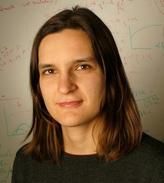埃斯特·迪弗洛 发表评论(0) 编辑词条
2010年克拉克奖编辑本段回目录
美国经济学会(American Economic Association)星期五宣布,麻省理工学院教授埃斯特·迪弗洛(Esther Duflo)荣获今年的约翰·贝茨·克拉克奖(John Bates Clark Economist Award)。这一被称作小诺贝尔经济学奖的奖项专门颁发给40岁以下、为经济学思想和知识做出卓越贡献的年轻经济学家。
今年37岁的女学者迪弗洛是法国公民,在麻省理工学院经济学系担任发展经济学教授。美国经济学会在一份声明中说,迪弗洛通过随机实验来找到解决发展中国家在政治、性别和教育方面存在问题的途径,在发展经济学领域取得了突出的成绩。在一系列论文中,她深入研究了印度农村女性政治领导人的影响。比如,她发现这些女性领导人往往把开支从教育转移到饮用水。迪弗洛的研究有助于确定哪些扶贫项目更加有效。
埃斯特.迪弗洛编辑本段回目录
迪弗洛还通过实地考察深入研究美国的养老政策,以发现哪种刺激措施和社会压力能够鼓励人们为退休后保持较高的生活水准而增加储蓄。
此外,她还就最近几年来金融领域的增长如何扰乱社会和经济活动进行了卓有成效的研究。
过去曾经获得约翰·贝茨·克拉克奖的学者包括保罗·萨缪尔森、米尔顿·弗里德曼和保罗·克鲁格曼等后来荣获诺贝尔经济学奖的著名经济学家,以及奥巴马总统的国家经济委员会主任劳伦斯·萨默斯。据统计,约翰·贝茨·克拉克奖获得者中,有36%后来赢得了诺贝尔经济学奖。
以1938年去世的哥伦比亚大学教授约翰·贝茨·克拉克命名的这一奖项是1947年设立的,开始时每两年颁发一次,现在已经改为每年颁发一次。去年获得约翰·贝茨·克拉克奖的学者是加利福尼亚大学伯克利分校教授伊曼纽尔·塞兹,他针对收入不平等问题进行了大量研究。
Esther Duflo win the Clark medal编辑本段回目录
MIT economist Esther Duflo PhD ‘99, whose influential research has prompted new ways of fighting poverty around the globe, was named winner today of the John Bates Clark medal. Duflo is the second woman to receive the award, which ranks below only the Nobel Prize in prestige within the economics profession and is considered a reliable indicator of future Nobel consideration (about 40 percent of past recipients have won a Nobel).
Duflo, a 37-year-old native of France, is the Abdul Latif Jameel Professor of Poverty Alleviation and Development Economics at MIT and a director of MIT’s Abdul Latif Jameel Poverty Action Lab (J-PAL). Her work uses randomized field experiments to identify highly specific programs that can alleviate poverty, ranging from low-cost medical treatments to innovative education programs.
Duflo, who officially found out about the medal via a phone call earlier today, says she regards the medal as “one for the team,” meaning the many researchers who have contributed to the renewal of development economics. “This is a great honor,” Duflo told MIT News. “Not only for me, but my colleagues and MIT. Development economics has changed radically over the last 10 years, and this is recognition of the work many people are doing.”
The American Economic Association, which gives the Clark medal to the top economist under age 40, said Duflo had distinguished herself through “definitive contributions” in the field of development economics. “Through her research, mentoring of young scholars, and role in helping to direct the Abdul Latif Jameel Poverty Action Lab at MIT, she has played a major role in setting a new agenda for the field of development economics, one that focuses on microeconomic issues and relies heavily on large-scale field experiments,” the association said in a statement.
Fighting poverty
In 2003, Duflo co-founded J-PAL along with one of her mentors and frequent collaborators, Abhijit Banerjee, MIT’s Ford International Professor of Economics, as well as economist Sendhil Mullainathan, now of Harvard. While Duflo’s own work has often focused on fieldwork in India and Kenya, J-PAL supports research in dozens of countries, and aims to work with both governments and nongovernmental organizations to implement anti-poverty programs.
“The field has exploded over the last few years,” says Duflo. Her receipt of the Clark medal, she adds, “is a sign that the field is so alive. Many more young people are now working in development economics, and hopefully that will continue.”
In one notable study, Duflo, together with Banerjee and J-PAL’s executive director, Rachel Glennerster, found that the rate at which families in northern India will immunize their children jumps from about 5 percent to nearly 40 percent when parents are offered a small bag of lentils as an incentive. Duflo, Harvard economist Michael Kremer, and economist Jonathan Robinson of the University of California, Santa Cruz, have run repeated experiments in Kenya that help farmers use fertilizer in a more efficient fashion.
Much of Duflo’s work has analyzed educational practices. After an experiment involving more than 120 schools in Kenya, Duflo, Kremer, and Pascaline Dupas of UCLA concluded that dividing classes into groups based on student performance can help both high-achieving students (because they benefit from being around their strongest peers) and low-achieving students (because they can be taught at a level more comprehensible to them). In India, Duflo, Stephen Ryan of MIT and Rema Hanna of Harvard discovered that instructor attendance at rural, one-teacher schools improved notably when verified by date-stamped cameras and linked to salary; student performance improved as a result.
While these research projects typically take place on small scales at first, J-PAL works to broaden the scope of successful experiments. After Kremer and economist Edward Miguel of the University of California at Berkeley showed that giving children medicine to free them of intestinal worms markedly helps school attendance, J-PAL helped start Deworm the World, a nonprofit organization that helped the Kenyan government treat 3.6 million children in 2009.
“We are extremely happy for Esther and MIT,” said Ricardo Caballero, chair of the Department of Economics and the Ford International Professor of Economics, Macroeconomics and International Finance. “She has built one of the most successful academic careers I can recall in recent times while making a huge difference for the poor around the world. This award is the latest recognition to her superb work but surely not the last one. What a collection she is putting together.”
A series of honors
The Clark medal is one of several prizes Duflo has been awarded recently. In 2009, she received a MacArthur Fellowship; was the first recipient of the Calvó Armengol International Prize from the Barcelona Graduate School of Economics; became a member of the American Academy of Arts and Sciences; and delivered a lecture series at the College de France in Paris, having been named that institution's first holder of its "Knowledge Against Poverty" chair. J-PAL claimed a significant new international prize in January 2009, the BBVA Foundation Frontiers of Knowledge Award in the category of Development Cooperation.
MIT economist Paul Samuelson was given the first Clark medal, in 1947, while MIT graduate Emmanuel Saez PhD ’99 was awarded last year’s prize. The most recent MIT faculty member to win the medal, before Duflo, was Daron Acemoglu, now MIT’s Charles P. Kindleberger Professor of Applied Economics, in 2005. Prior to 2010, the Clark medal had only been awarded in odd-numbered years; now it is given annually.
Past MIT faculty members who have won the Clark medal include Samuelson, Robert Solow (who won it in 1961), Jerry Hausman (1985), Paul Krugman (1991) and Acemoglu. MIT alumni who have won the award include Lawrence Klein PhD ’44 (1959), Joseph Stiglitz PhD ’67 (1979), Lawrence H. Summers ’75 (1993), Steven Levitt PhD ’94 (2003) and Saez.
本词条由以下会员参与贡献
附件列表
→如果您认为本词条还有待完善,请 编辑词条
词条内容仅供参考,如果您需要解决具体问题
(尤其在法律、医学等领域),建议您咨询相关领域专业人士。
0

同义词: 暂无同义词
关于本词条的评论 (共0条)发表评论>>
 编辑实验
创建词条
编辑实验
创建词条

